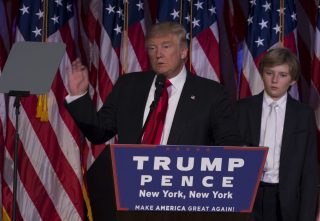 November is proving to be a big month for Donald Trump. Not only has he won the U.S. Presidential election, but he’s scheduled to go to trial later this month for alleged fraud committed by Trump University. Attorneys are meeting on Thursday in preparation for the trial, and jury selection is expected to begin November 28.
November is proving to be a big month for Donald Trump. Not only has he won the U.S. Presidential election, but he’s scheduled to go to trial later this month for alleged fraud committed by Trump University. Attorneys are meeting on Thursday in preparation for the trial, and jury selection is expected to begin November 28.
Big civil trials can drag on for some time, so people may be wondering: what happens if the trial is still going on when Trump is sworn into office? Can a sitting President be sued, even if it’s for something he did before taking office? While it’s unclear whether a President can face criminal prosecution while in office (and there are opinions, including from the Justice Department, that say no), U.S. Presidents are not entirely immune from civil lawsuits.
The Supreme Court decided this when Paula Jones sued President Bill Clinton while he was in office. Jones alleged that Clinton sexually harassed her while he was Governor of Arkansas. Clinton argued that any action against him should be held off as long as he was in office. The Court disagreed, ruling that the President can indeed be sued for alleged actions that took place prior to taking office or that are not related to the Presidency. Justice John Paul Stevens wrote in his 1997 opinion that while Presidents may be protected from liability regarding official actions in office so they can “perform their designated functions effectively without fear,” that protection does not extend to unofficial conduct. The protection against damages for official acts was determined by the Supreme Court in the 1982 Nixon v. Fitzgerald decision.
But about Trump University, and other cases that Trump is facing that are already in motion? Would they keep going, or be put on hold for the duration of his term in office? Professor Edward Foley, director of Election Law @ Mortiz at The Ohio State University’s Moritz College of Law, said that situations like this could be decided by courts on a case by case basis. On the one hand, “the judiciary will want to look to the principle that no one is above the law,” Foley said. On the other hand, there is “the risk of a civil lawsuit being a genuine distraction such that it outweighs the interests of the litigants in the civil suit.” The judiciary would exercise their discretion, he said, given that “the President is the chief executive of the nation,” and shouldn’t have to face the distractions of litigation unless it’s truly necessary.
So Trump would technically not be immune from any of his pending civil cases while in office, but the judges would have to determine whether it’s worth going forward right away or waiting until his term is over. And many experts believe they may end up being delayed.
[Image via lev radin/Shutterstock]
Have a tip we should know? [email protected]